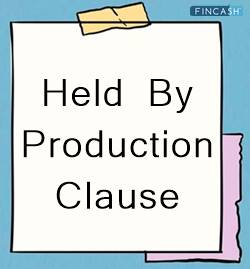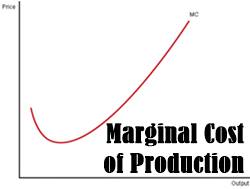
Table of Contents
Held By Production Clause
The Held By Production (HBP) clause is a provision in the oil and natural gas Industry, a condition in a contract or Lease that strengthens an entity's ability to manage a property or franchise if specific gas and oil production standards are fulfilled.

The lessee's right to operate the property is extended beyond the initial lease period. Mineral property leases have this clause as well. "Habendum" clause is another name for these clauses.
Understanding Habendum Clause
The Habendum Clause is a contract or lease term that outlines the kind of benefits and rights a beneficiary or lessee can exercise. The details of the habendum clause vary from contract to contract, but ownership is always stated.
In leases and contracts, habendum provisions are crucial since they specify property ownership transfer and allow for the extension of a lease duration or term.
The lease durations in mining or oil and gas leases can be either of the two: the primary term or the secondary term.
Primary Term
The length of this period is usually 1-3 years. It refers to the maximum length of time a lessee has to determine whether or not to conduct exploration and drilling. To prolong a lease beyond its initial term, the lessee must either reach production standards relevant to the leased area or engage in drilling and exploring operations on the leased area or a portion of it.
Secondary Term
This term is followed by the primary term and is determined by whether or not paying amounts of output have been recognised and established. According to the clause, this lease shall remain in existence and effect for a duration of n years and as long as oil or gas is produced thereafter.
In terms of the HBP clause, the elements that determine the structure of a lease or contract can be negotiated. It means that the parties concerned (the lessee and the lessor) can benefit equally from the execution of this agreement or lease. The lesse is the party who’ll produce the mineral, whereas the lessor is the owner of Land.
Talk to our investment specialist
How Does this Clause Work?
The held-by-production clause allows energy firms to avoid renegotiating leases after the first (primary) term expires and instead operate under a secondary term for the duration of an oil or gas field's Economic Life cycle. This saves them a lot of money, especially in places where oil and gas wells are abundant. Leaseholders would understandably seek much greater prices to renegotiate leases, given that property prices in such locations are normally on the rise.
Example of Held By Production Clause
XYZ oil company (the oil firm) reserves the right, but not the Obligation, to operate on Property ABC (land held by Mr.X) for a period of 4 years. If the oil business starts producing oil, the company reserves the right to extend the lease term for another 5 years.
The Bottom Line
HBP can be a favourable or unfavourable contribution to value, depending on which side of the negotiation one is on. As a result, having an analyst with experience on both sides of industry negotiations is crucial to have to enter an effective contract.
All efforts have been made to ensure the information provided here is accurate. However, no guarantees are made regarding correctness of data. Please verify with scheme information document before making any investment.












